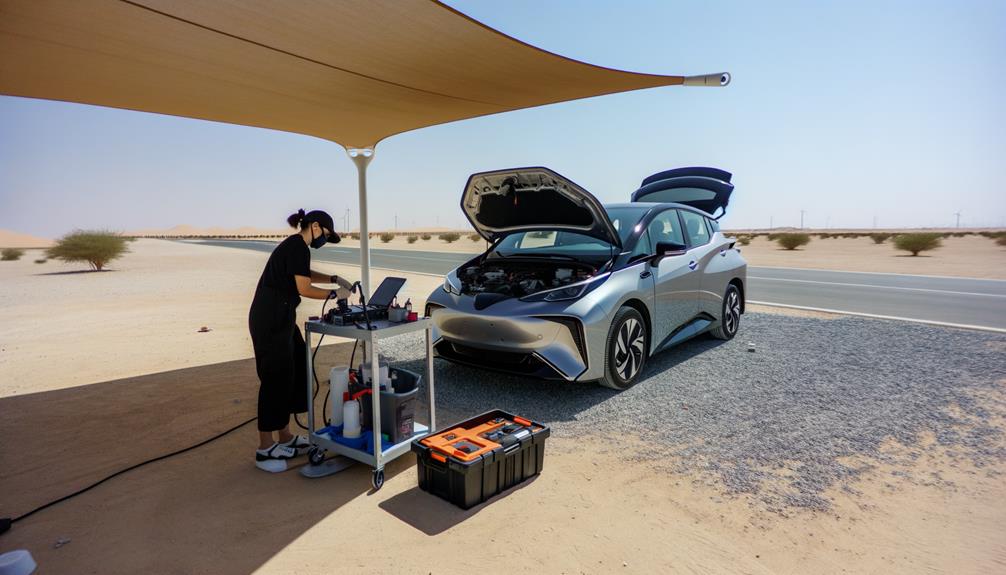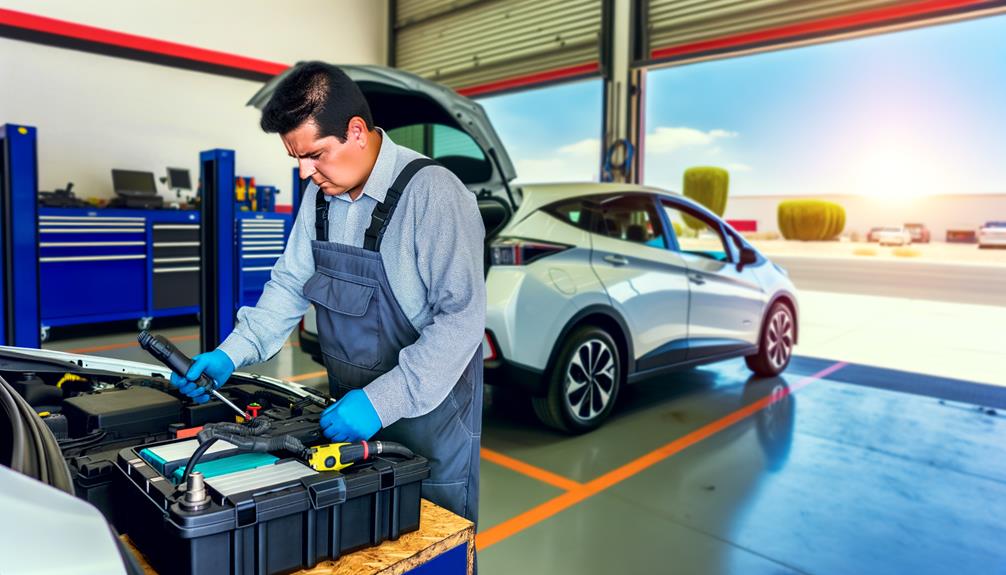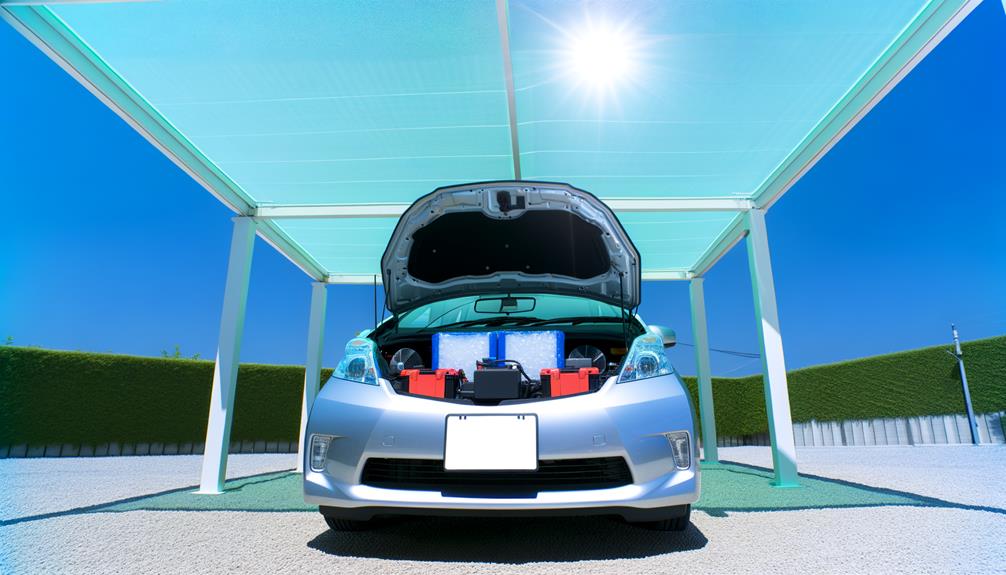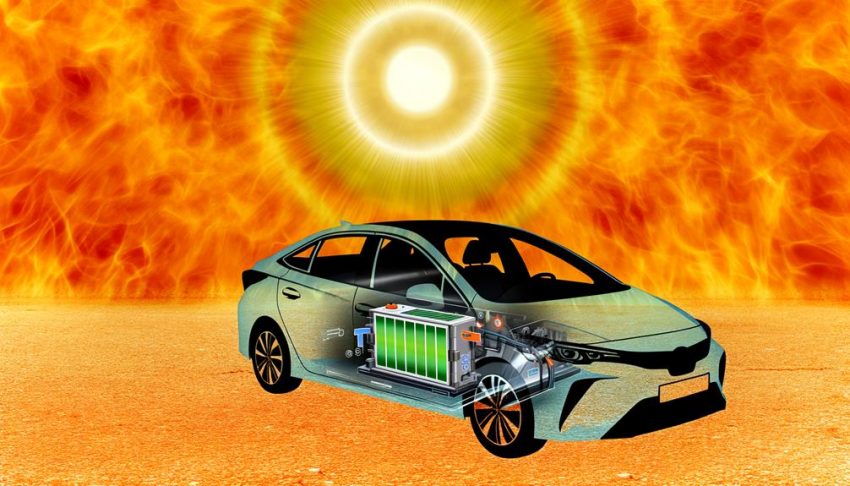Have you ever wondered how hot weather impacts your hybrid Toyota car battery? It's more significant than you might think. Elevated temperatures can cause mechanical damage and reduce the battery's recharge capacity, leading to accelerated degradation. When temperatures soar above 105°F (41°C), the battery's lifespan and efficiency take a hit, affecting your vehicle's overall performance. But don't worry, there are ways to mitigate these effects and keep your hybrid running smoothly. Curious about how to protect your investment during those scorching summer months? Let's explore strategies and tips that can make a big difference.
Contents
Impact of Heat on Battery
During periods of extreme heat, hybrid car batteries, especially those using nickel-metal hydride (NiMH) technology, face notable risks that can impair their functionality. High temperatures can cause the NiMH hybrid battery to bulge or bubble, which can lead to mechanical damage. This deformation is a direct result of excessive heat causing the internal components of the car battery to expand beyond their designed limits.
Evaporation of electrolytes is another vital issue linked to high operating temperatures. When the temperature rises, the electrolytes inside the hybrid battery evaporate more quickly, reducing the battery's capacity to recharge effectively. This evaporation process diminishes the battery's ability to store energy, directly impacting its efficiency and performance.
Moreover, extreme weather conditions, particularly heat, can considerably shorten the lifespan of hybrid batteries. Prolonged exposure to temperatures above 105°F (41°C) can lead to a decline in performance and longevity. Such exposure forces the battery to work harder, exacerbating wear and tear. The financial implications are substantial, with replacement costs for hybrid batteries ranging from $1,000 to $5,000.
Maintaining an ideal operating temperature is vital for the health of your hybrid battery. When the temperature exceeds 105°F, you can expect a noticeable decline in battery efficiency. This reduction in efficiency translates to reduced fuel economy, as the car battery struggles to store and deliver energy effectively. As a result, if you live in an area prone to extreme weather, it is important to take proactive measures to protect your hybrid battery from excessive heat to promote its longevity and performance.
Fuel Efficiency in Hot Weather
Given the significant impact of heat on hybrid car batteries, it's important to understand how these effects translate to fuel efficiency, especially in hot weather. When temperatures rise, the efficiency of your car's battery can decrease, directly affecting your vehicle's miles per gallon (MPGs). For hybrid vehicles like the Toyota RAV4, this can mean a noticeable drop in fuel economy.
Hot weather can lead to decreased battery efficiency, which directly impacts fuel economy by reducing the vehicle's miles per gallon (MPGs). For instance, Toyota hybrids typically average between 35-41 MPG in hot climates, but highway MPG may fall below 35 due to heat effects on battery performance. The ideal battery performance is generally between 100°F and 115°F, but temperatures exceeding 105°F can lead to reduced battery capacity and output.
Additionally, the increased use of air conditioning during high temperatures can further diminish fuel efficiency. This often results in MPG averages dropping from 39 to around 35-41 during extreme heat. Consequently, during prolonged periods of high temperatures, you may notice a significant decrease in your car's fuel efficiency.
Key considerations for fuel efficiency in hot weather include:
- Battery Efficiency: Decreased efficiency due to high temperatures.
- Air Conditioning: Increased use leads to lower MPG.
- Ideal Performance: Achieved between 100°F and 115°F.
- Highway Driving: MPG may drop below 35 due to heat.
- Regular Inspections: Essential for maintaining battery health and fuel efficiency.
Maintaining battery health through regular inspections and cooling strategies is essential for sustaining ideal fuel efficiency during hot weather conditions. Understanding these factors can help you manage your hybrid vehicle more effectively in high temperatures.
Routine Maintenance Tips

Maintaining your hybrid Toyota's battery health hinges on regular and thorough inspections, which can nip heat-related issues in the bud. Routine maintenance is key to guaranteeing your vehicle runs efficiently, especially in hot weather. Start with frequent battery health assessments. These evaluations can detect early signs of trouble, such as bulging or electrolyte evaporation, before they escalate into costly repairs.
A critical aspect of these assessments includes checking the battery cooling system. This system plays a pivotal role in preventing overheating, which can degrade battery performance and lifespan. During multi-point inspections, verify that the cooling system is fully operational. This involves examining the battery fan vents to confirm they are clear of obstructions, as proper airflow is essential for maintaining ideal battery temperature.
In addition to these checks, consult with service specialists who have the expertise to provide valuable insights into your battery's condition. They can offer tips for preventing overheating, tailored to your specific driving conditions and local climate. These professionals can also recommend necessary cooling strategies, such as periodic maintenance of the cooling system, to mitigate the impacts of high temperatures.
Regular maintenance doesn't just protect your battery; it can also enhance your vehicle's fuel efficiency. A well-maintained battery is more effective at storing and utilizing energy, particularly in extreme heat. By adhering to these routine maintenance tips, you can guarantee that your hybrid Toyota operates smoothly and efficiently, no matter the weather conditions. Consistent care and attention to your vehicle's battery cooling system and overall health are essential for long-term performance and reliability.
Keeping Battery Cool
To guarantee your hybrid Toyota car battery remains cool in hot weather, you'll need to take several measures. Use the air conditioning regularly, as the battery is often situated under the back seats and requires cabin cooling to prevent overheating. Additionally, installing window tinting and opting for shaded parking can greatly reduce internal temperatures, lowering the risk of battery damage.
Utilize Air Conditioning
Running the air conditioning in your hybrid Toyota is vital for maintaining a cooler environment for the battery, especially in hot weather. The hybrid battery, often located under the back seats, is prone to overheating if not properly cooled. Utilizing the air conditioning system can notably prevent this issue and consequently preserve the battery's life and efficiency.
Ideal air conditioning settings are important. Balancing between comfort and energy efficiency, low fan speeds combined with moderate temperatures can effectively cool both the cabin and the hybrid battery. This approach not only enhances driver comfort but also plays a considerable role in maintaining performance and longevity in extreme heat conditions.
Consider the following to effectively use air conditioning for battery cooling:
- Avoid blocking battery air vents: Guarantee unobstructed airflow to prevent overheating.
- Regular use of air conditioning: Helps maintain a stable temperature around the battery.
- Ideal settings: Use low fan speeds and moderate temperatures for efficient cooling.
- Monitor cabin temperature: Keeping the cabin cool prevents excessive heat buildup around the battery.
- Maintenance checks: Regularly inspect air conditioning and battery cooling systems for ideal performance.
Install Window Tinting
While utilizing the air conditioning system efficiently is important for keeping your hybrid Toyota's battery cool, installing window tinting provides another layer of protection against excessive heat. Window tinting can greatly reduce the interior temperature of your car, which is essential during hot weather. By blocking direct sunlight, window tinting minimizes the risk of thermal runaway and potential damage to the hybrid battery from prolonged high-temperature exposure.
Ceramic window tinting is particularly effective, enhancing comfort and reducing interior temperatures even when external conditions range from 90-100°F. This temperature control helps maintain the battery's ideal performance and longevity, as cooler conditions contribute to improved battery efficiency. Data shows that high internal temperatures can lead to decreased battery efficiency, so reducing heat is crucial for maintaining your vehicle's performance.
Additionally, regular maintenance checks are important, but when combined with effective window tinting, they guarantee the battery cooling system functions properly. This thorough approach further protects the battery from heat-related issues. To sum up, installing window tinting in your hybrid Toyota is a data-driven method to safeguard your battery against hot weather, enhancing both comfort and efficiency.
Choose Shaded Parking
Parking in shaded areas is essential for maintaining the ideal performance and longevity of your hybrid Toyota's battery. Shaded parking can considerably reduce the internal temperatures of your vehicle, protecting the battery from excessive heat that can lead to damage and decreased performance. Prolonged exposure to direct sunlight can cause the electrolyte in your hybrid battery to evaporate, increasing the risk of bulging or bubbling in nickel-metal hydride batteries.
To optimize your battery's lifespan and performance, consider the following strategies:
- Choose covered parking options whenever possible to prevent overheating.
- Utilize sunshades and tinted windows to minimize cabin heat.
- Park under trees or structures that provide natural shade.
- Avoid parking in open, sun-exposed areas for extended periods.
- Regularly check and maintain your vehicle's battery cooling system.
Professional Assistance

For ideal battery performance in hot weather, Toyota of Orlando offers professional hybrid car battery maintenance services, available seven days a week. Their service specialists can conduct thorough inspections to detect heat-induced battery issues early, potentially saving you from costly repairs. Regular check-ups by professional technicians can greatly enhance your battery's lifespan and performance.
Expert Battery Maintenance
Expert battery maintenance is essential to guarantee your hybrid Toyota car performs at its best, especially under the strain of hot weather. Regular maintenance check-ups are imperative to optimize hybrid battery performance and longevity. At Toyota of Orlando, professional technicians offer extensive battery maintenance services to help mitigate the effects of high temperatures.
Key maintenance tasks include:
- Thorough Inspections: Expert technicians can identify any heat-related issues affecting your hybrid battery.
- Electrolyte Checks: Regularly checking for electrolyte evaporation helps maintain battery efficiency.
- Cooling System Assessment: Ensuring the cooling system functions properly is important to prevent heat damage.
- Performance Optimization: Routine check-ups considerably enhance the overall performance and lifespan of your hybrid battery.
- Customer Support: Reach out to customer support at (407) 298-0001 to schedule professional battery assessments.
Convenient Service Availability
Available for your convenience, Toyota of Orlando guarantees hybrid car battery maintenance services are accessible seven days a week, making it easy to prioritize your vehicle's health even with a busy schedule. This means you can easily fit routine maintenance into your calendar, making sure your hybrid battery is performing at its best, especially during hot weather.
Professional technicians at Toyota of Orlando are equipped to assess and address battery health, essential for mitigating the adverse effects of high temperatures on battery performance. Routine maintenance plays a significant role in identifying potential issues early, which can prevent costly repairs down the line and make certain your battery lasts longer.
Data shows that regular check-ups can enhance both battery performance and lifespan, maintaining efficiency in extreme temperatures. Convenient access to these services means you're less likely to overlook necessary maintenance, which is important for sustaining your hybrid's functionality in hot weather conditions.
For inquiries or to schedule an appointment, you can contact Toyota of Orlando at (407) 298-0001. Their specialists are trained to deliver precise, data-driven assessments and solutions, making sure your hybrid vehicle remains in peak condition year-round.
User Experiences
Long-term hybrid owners, particularly those in scorching regions like Southern Arizona, consistently report robust performance and high fuel efficiency even when temperatures soar above 100°F. Despite the hot weather, hybrid efficiency and battery performance remain largely unaffected. This feedback highlights the resilience of Toyota hybrid systems under extreme conditions.
User experiences indicate that urban driving conditions favor better MPG due to the inherent hybrid efficiency at lower speeds. Even with the increased air conditioning usage in hot weather, the battery performance remains stable. This is particularly notable given that hybrid systems are designed to operate efficiently in stop-and-go traffic, where urban driving is most common.
Notably, some drivers have observed that while highway driving in extreme heat may slightly reduce fuel efficiency, city driving tends to maintain peak MPG performance. This underscores the importance of understanding driving patterns and their impact on hybrid vehicles in hot climates. Here are some key points from user feedback:
- High MPG Averages: Users report high MPG averages even in temperatures exceeding 100°F.
- Reliable Battery Performance: Battery performance remains consistent, showing no significant degradation in extreme heat.
- Urban Driving Efficiency: Better MPG observed in urban driving conditions despite higher A/C usage.
- Highway vs. City Driving: City driving maintains better MPG compared to highway driving in hot weather.
- Regular Maintenance: Emphasis on regular maintenance and vehicle checks to guarantee reliability and longevity.
Battery Protection Strategies

While user experiences emphasize the resilience and efficiency of Toyota hybrid systems in extreme heat, it's equally important to understand proactive measures for battery protection. Implementing robust battery protection strategies can guarantee your hybrid vehicle performs at its best, even in hot weather conditions.
One effective strategy is parking in shaded or covered areas. This simple action can markedly reduce the internal temperature of your vehicle, protecting the battery from excessive heat exposure.
| Strategy | Benefit |
|---|---|
| Parking in shaded/covered areas | Reduces internal temperature, protecting the battery from excessive heat exposure |
| Fully charging the battery | Maintains battery efficiency and prevents overheating |
| Regular maintenance of cooling system | Guarantees proper airflow and temperature regulation |
| Periodic battery inspection | Early detection of leaks or damage to prevent heat-related issues |
| Using heated garages/shelters | Preserves battery integrity by mitigating temperature fluctuations |
Fully charging your hybrid battery before exposing it to extreme heat can also help. A fully charged battery is less likely to overheat, maintaining its efficiency and prolonging its life.
Regularly checking and maintaining the battery's cooling system is essential. Guaranteeing proper airflow and temperature regulation can prevent heat-related damage. This includes cleaning air filters and inspecting cooling fans to make sure they are functioning correctly.
Periodic battery inspections are vital for identifying potential issues like leaks or physical damage. Early detection allows you to address these problems before they worsen due to high temperatures.
Lastly, using heated garages or shelters during extreme cold helps preserve the battery's integrity. Even though this strategy is more relevant for cold weather, it indirectly protects the battery from temperature fluctuations that could affect its performance in hot weather.
Frequently Asked Questions
Does Hot Weather Affect Hybrid Batteries?
Yes, hot weather affects hybrid batteries. High temperatures can reduce battery performance, shorten battery lifespan, and cause damage under temperature extremes. Regular maintenance and keeping the vehicle cool can mitigate the heat impact on your hybrid's battery.
How to Keep Hybrid Battery Cool in Summer?
To keep your hybrid battery cool in summer, use these battery cooling techniques: employ window tinting, sunshades, shaded parking, and air conditioning. These summer driving tips, along with regular battery maintenance practices, optimize heat management systems and guarantee battery longevity.
Why Does My Toyota Hybrid Battery Keep Dying?
Your Toyota hybrid battery's dying due to reduced battery lifespan from temperature effects, leading to charging issues. Routine maintenance tips, like checking for overheating, extend battery life. Addressing high temperatures is essential for best performance and longevity.
What Temperature Should Toyota Hybrid Battery Run At?
Your Toyota hybrid battery should run within a temperature range of 100°F to 115°F for ideal operating conditions. Thermal management systems help maintain these conditions, essential for battery lifespan factors and preventing damage from overheating.
Conclusion
In hot weather, your hybrid Toyota's NiMH battery faces mechanical damage, reduced recharge capacity, and accelerated degradation, severely impacting vehicle performance. Elevated temperatures decrease battery efficiency, leading to lower MPG. To mitigate these effects, prioritize regular maintenance and monitoring. Implement strategies to keep the battery cool and consider professional assistance when necessary. User experiences and data underscore the importance of proactive measures to protect your battery and maintain peak performance in hot climates.
